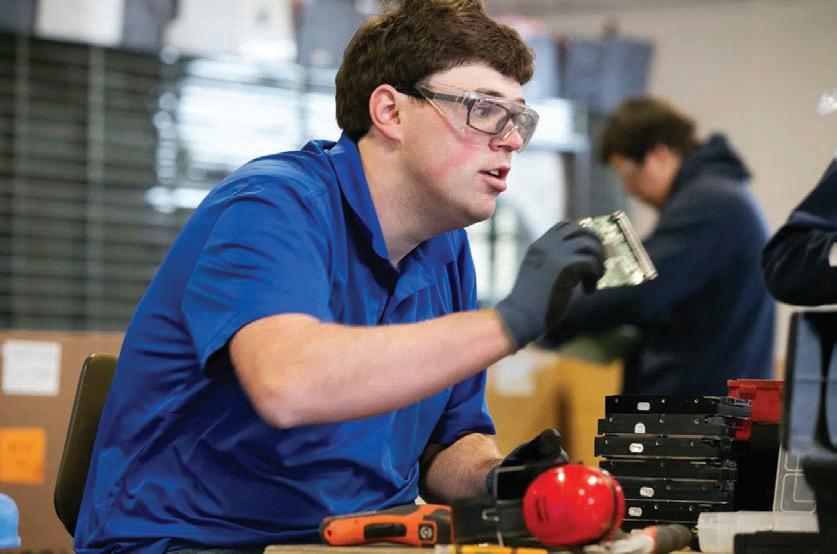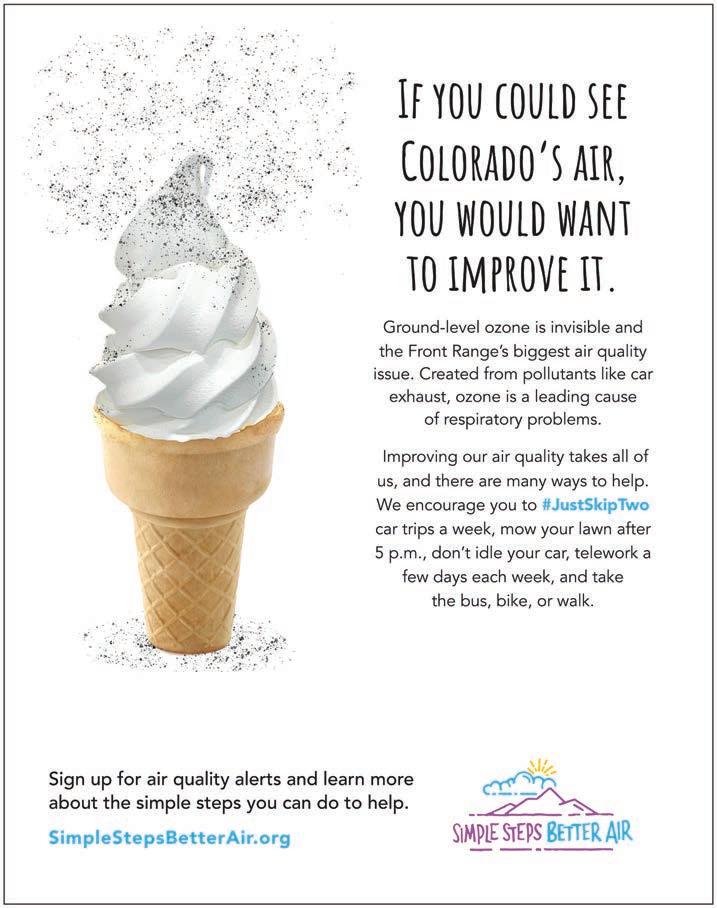
4 minute read
DONATIONS
Blue Star’s CEO. His dad, Bill, started the company in 2009 in Colorado Springs. “We’ve had folks who’ve been with us in Colorado Springs for 13 to 15 years and they are still exceeding their goals every week. And they’re doing the exact same thing every day.” e company has diverted 34 million pounds of electronics from land lls and continues to do so. e pandemic strained its growth and caused Blue Star to close newer operations in Chicago and Boulder. But something it did months before the pandemic changed its trajectory. After sharing their workforce results with a team of electronics recyclers in 2019, Blue Star doubled down on its original mission: nding job opportunities for people with developmental disabilities. Blue Star’s employees are rarely absent, very focused on their daily tasks and have a good attitude, according to a case study on the company’s workforce.
“It was just the real simple stu : zero absenteeism and lost-time accidents, 98% on-task engagement, all the measurables that everyone is so focused on, it became pretty clear that they were going ‘Omigosh, how do we get in on this?’” Morris said. “What we’ve found over the years is that, especially for folks on the autistic spectrum, they are just unbelievably good at that systematic step-by-step task. Whether it’s putting something together or taking it apart, if it’s the same everyday and they know what to expect, that’s their comfort zone.”
Blue Star began a national training program for the organization behind the e-Stewards certi cation, an ewaste recycling standard that bans exporting toxic e-waste to developing nations.
Before it launched the Advanced Plus program, Blue Star had employed roughly 60 individuals with a diagnosed developmental disability. After setting up the training program in 2019, “we’re almost at 200,” Morris said. “It became clear pretty quickly that this was the best approach.” e Conservancy teamed up with Bayaud Enterprises to hire unhoused residents to pick up trash and assist city workers with landscaping in a program called Civic Center Works, which launched in April 2022.
When city budgets got slashed during the pandemic, Denver’s Department of Parks and Recreation felt the pain and was unable to hire the usual crew of seasonal workers. at’s when the nonpro t Civic Center Conservancy, which exists to support Civic Center park, began strategizing.
“ e narrative around Civic Center in some way, shape or form was that the homeless were a drain on Civic Center and it was something that was bringing it down. But we knew the unhoused community were some of the park’s biggest advocates. And we had seen from before (the pandemic) that the people nding community in our park, Civic Center park, were the ones who were walking around picking up trash and taking care of it,” said Eric Lazzari, the Conservancy’s executive director.
Last year, 24 people were hired to work six hours a day, three days a week for the season. Ten moved on to permanent jobs with the parks department or used the program as a stepping stone in their career path. is season, there’s about ve people on the job daily with about a dozen in the program, he said.
“ ese are folks making the steps to transition out of homelessness and were looking for jobs,” Lazzari said. “What started out as a parks problem solved the parks problem but also impacted and changed the lives of others.”
What started as a side project for Nick Reichert and friend Lance Harding to make a few extra bucks in 2016 is now a couch refurbishing and upcycling business helping those in need.
“One of our rst couches actually went to someone who was just getting o the streets,” said Reichert, who was a y shing guide in the Vail Valley when he noticed free couches on Craigslist that were often in decent condition. “I’ve always had a heart, especially for the homeless. He was just so excited to get this really nice couch that had been xed up and cleaned up (and) delivered to his house.” e Good Couch in Lakewood today receives about 50 couches a week (it also o ers pickup). After cleaning and xing them, the couches are sold online. at helps sustain the company, which is pro table. It donates some of the proceeds to the Colorado Coalition for the Homeless but also provides couches to folks who are getting a home after living on the streets. Harding is a founder but no longer part of the business. But some couches are in such bad shape or, well, just outdated, ugly and unsellable. ose ones are stripped for parts and recycled to avoid the land ll or upcycled into something new.
“Being a y shing guide, I have a heart for sustainability. I want to see as little waste go into the land ll as possible,” he said. “In couches, there’s just all this wood and metal, upholstery foam. None of that’s good in a land ll.”
Wood and metal has been used for shelving and the company’s storage shed. Extra frames, hardware and legs are used to x up other couches. Reichert also estimates that e Good Couch has saved 1,000 pounds of leather from land lls. ey recently began working with American Made Apparel Manufacturing in Aurora to do something with those leather scraps. Now it has a line of handbags, wallets and card holders — all made in Denver with leather from unwanted couches.
“I’d say that at least 95% of what we take is at least partially or fully disassembled and reused,” he said. “ e most ful lling part is de nitely being able to get furniture to the people who (the Coalition) is able to place in semi-permanent housing. And there’s a lot of other ministries and organizations now, too, that know about us and are able to recommend us so we do get to give away a fair amount of couches every month to folks in need.” is story is from e Colorado Sun, a journalist-owned news outlet based in Denver and covering the state. For more, and to support e Colorado Sun, visit coloradosun.com. e Colorado Sun is a partner in the Colorado News Conservancy, owner of Colorado Community Media.













